中考英语(一):英语语法八大易错点
英语语法八大易错点
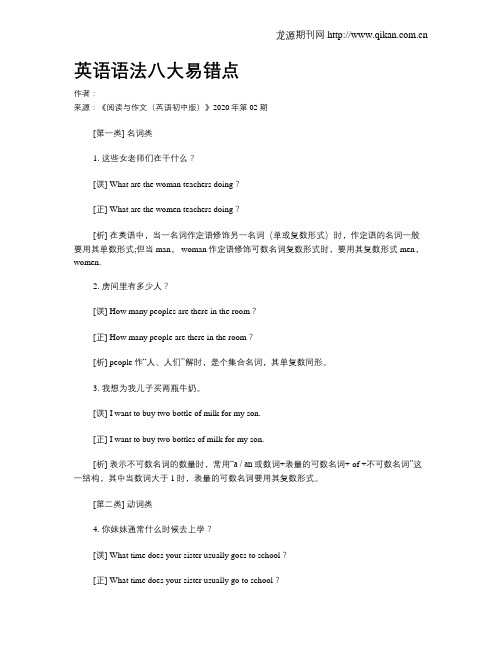
龙源期刊网
英语语法八大易错点
作者:
来源:《阅读与作文(英语初中版)》2020年第02期
[第一类] 名词类
1. 这些女老师们在干什么?
[误] What are the woman teachers doing?
[正] What are the women teachers doing?
[析] 在英语中,当一名词作定语修饰另一名词(单或复数形式)时,作定语的名词一般
要用其单数形式;但当man, woman作定语修饰可数名词复数形式时,要用其复数形式men,women.
2. 房间里有多少人?
[误] How many peoples are there in the room?
[正] How many people are there in the room?
[析] people作“人、人们”解时,是个集合名词,其单复数同形。
3. 我想为我儿子买两瓶牛奶。
[误] I want to buy two bottle of milk for my son.
[正] I want to buy two bottles of milk for my son.
[析] 表示不可数名词的数量时,常用“a / an或数词+表量的可数名词+ of +不可数名词”这一结构,其中当数词大于1时,表量的可数名词要用其复数形式。
[第二类] 动词类
4. 你妹妹通常什么时候去上学?
[误] What time does your sister usually goes to school?
[正] What time does your sister usually go to school?。
2020年中考英语复习 语法查漏补缺——连词、介词(无答案)
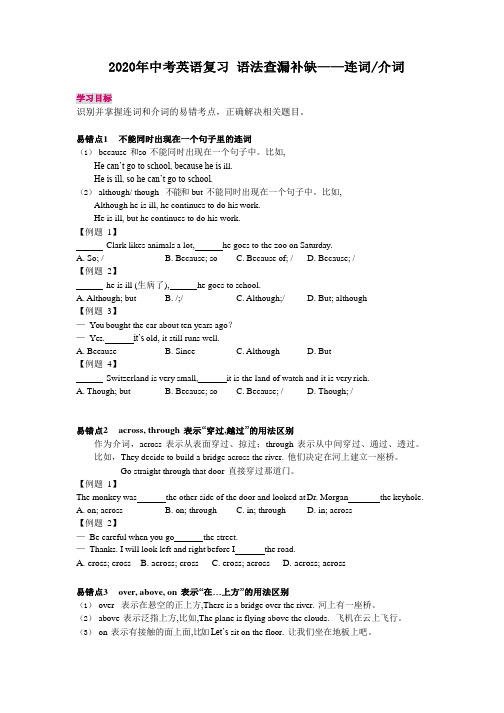
2020年中考英语复习语法查漏补缺——连词/介词学习目标识别并掌握连词和介词的易错考点,正确解决相关题目。
易错点1不能同时出现在一个句子里的连词(1)because 和so 不能同时出现在一个句子中。
比如,He can’t go to school, because he is ill.He is ill, so he can’t go to school.(2)although/ though 不能和but 不能同时出现在一个句子中。
比如,Although he is ill, he continues to do his work.He is ill, but he continues to do his work.【例题1】Clark likes animals a lot, he goes to the zoo on Saturday.A. So; /B. Because; soC. Because of; /D. Because; /【例题2】he is ill (生病了), he goes to school.A. Although; butB. /;/C. Although;/D. But; although【例题3】—You bought the car about ten years ago?—Yes. it’s old, it still runs well.A. BecauseB. SinceC. AlthoughD. But【例题4】Switzerland is very small, it is the land of watch and it is very rich.A. Though; butB. Because; soC. Because; /D. Though; /易错点2across, through 表示“穿过,越过”的用法区别作为介词,across 表示从表面穿过、掠过;through 表示从中间穿过、通过、透过。
中考英语语法精讲一__名词
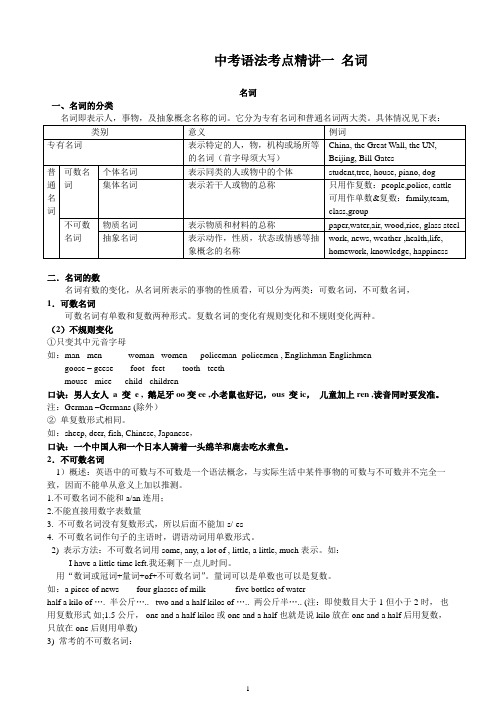
中考语法考点精讲一名词名词一、名词的分类二.名词的数名词有数的变化,从名词所表示的事物的性质看,可以分为两类:可数名词,不可数名词,1.可数名词可数名词有单数和复数两种形式。
复数名词的变化有规则变化和不规则变化两种。
(2)不规则变化①只变其中元音字母如:man - men woman - women policeman- policemen , Englishman-Englishmen goose – geese foot - feet tooth - teethmouse - mice child - children口诀:男人女人 a 变e , 鹅足牙oo变ee ,小老鼠也好记,ous 变ic,儿童加上ren ,读音同时要发准。
注:German –Germans (除外)②单复数形式相同。
如:sheep, deer, fish, Chinese, Japanese,口诀:一个中国人和一个日本人骑着一头绵羊和鹿去吃水煮鱼。
2.不可数名词1)概述:英语中的可数与不可数是一个语法概念,与实际生活中某件事物的可数与不可数并不完全一致,因而不能单从意义上加以推测。
1.不可数名词不能和a/an连用;2.不能直接用数字表数量3. 不可数名词没有复数形式,所以后面不能加-s/-es4. 不可数名词作句子的主语时,谓语动词用单数形式。
2) 表示方法:不可数名词用some, any, a lot of , little, a little, much表示。
如:I have a little time left.我还剩下一点儿时间。
用“数词或冠词+量词+of+不可数名词”。
量词可以是单数也可以是复数。
如:a piece of news four glasses of milk five bottles of waterhalf a kilo of …. 半公斤….. two and a half kilos of ….. 两公斤半….. (注:即使数目大于1 但小于2 时,也用复数形式如;1.5公斤, one and a half kilos 或 one and a half 也就是说kilo 放在one and a half 后用复数,只放在one后则用单数)3) 常考的不可数名词:1.流体:water , air ,coffee, tea, milk, wine, juice, oil, honey, porridge,soup, ink2.固体:食品类:rice, bread, salt, butter, cheese, beef,chicken(鸡肉),fish(鱼肉),pork,meat非食品类:paper, glass(玻璃),wood, cotton, rain,snow,chalk3. 表示总称的词:food, fruit, drink, clothing, money, furniture,population4.抽象名词:work,weather, news, advice, music, fun, time, knowledge, information5.研究学科:maths, physics, politics【真题链接】1.______ we had making snowmen last Sunday! (2009天津)A What a great funB What great funC How a great funD how great fun2. There ____ a lot of good news in today's newspaper.A. isB. areC. wasD. Were三、名词的所有格名词所有格表示名词之间的所有关系。
中考英语语法易错易混知识点

中考英语语法易错易混知识点一、可数名词与不可数名词1.可数名词表示能够用数目表示的名词,常常可以用单数或复数形式来表示,其前可以加"a"或"an"。
例句:I have a book.(单数)/ I have two books.(复数)2.不可数名词表示不能用数目清楚地表示的名词,只能用单数形式,前面不能加"a"或"an"。
例句:I have some milk.(不可数名词)二、形容词与副词1.形容词修饰名词,用来描述或限定名词。
形容词通常放在名词的前面。
例句:She is a beautiful girl.2.副词用来修饰动词、形容词或其他副词,通常放在被修饰词的后面。
例句:He runs fast.三、一般现在时与现在进行时1.一般现在时表示经常性或习惯性的动作,叙述真理或客观事实。
例句:The sun rises in the east.(真理)/ He often plays soccer on weekends.(习惯性动作)2.现在进行时表示现在正在进行的动作。
例句:I am watching TV now.(正在进行的动作)四、一般过去时与过去进行时1.一般过去时表示已经结束的过去的动作。
例句:I finished my homework yesterday.(过去的动作已经完成)2.过去进行时表示过去其中一时刻正在进行的动作。
例句:They were playing basketball at 7 o'clock yesterday evening.(过去其中一时刻正在进行的动作)五、定冠词与不定冠词1.定冠词"the"用来特指已经提到过或可唯一确定的名词。
例句:I saw the boy in the park.(特指已经提到的男孩)2.不定冠词"a"或"an"用来表示泛指或不特指的名词。
【中考英语常考易错点】专题一名词
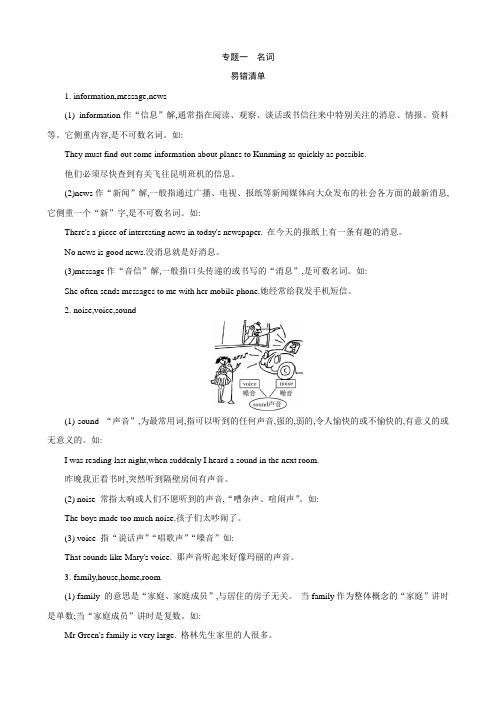
专题一名词易错清单1. information,message,news(1) information作“信息”解,通常指在阅读、观察、谈话或书信往来中特别关注的消息、情报、资料等。
它侧重内容,是不可数名词。
如:They must find out some information about planes to Kunming as quickly as possible.他们必须尽快查到有关飞往昆明班机的信息。
(2)news作“新闻”解,一般指通过广播、电视、报纸等新闻媒体向大众发布的社会各方面的最新消息,它侧重一个“新”字,是不可数名词。
如:There's a piece of interesting news in today's newspaper. 在今天的报纸上有一条有趣的消息。
No news is good news.没消息就是好消息。
(3)message作“音信”解,一般指口头传递的或书写的“消息”,是可数名词。
如:She often sends messages to me with her mobile phone.她经常给我发手机短信。
2. noise,voice,sound(1) sound “声音”,为最常用词,指可以听到的任何声音,强的,弱的,令人愉快的或不愉快的,有意义的或无意义的。
如:I was reading last night,when suddenly I heard a sound in the next room.昨晚我正看书时,突然听到隔壁房间有声音。
(2) noise 常指太响或人们不愿听到的声音,“嘈杂声、喧闹声”。
如:The boys made too much noise.孩子们太吵闹了。
(3) voice 指“说话声”“唱歌声”“嗓音”如:That sounds like Mary's voice. 那声音听起来好像玛丽的声音。
2023中考英语语法复习之考点专题——动词时态(原卷版)
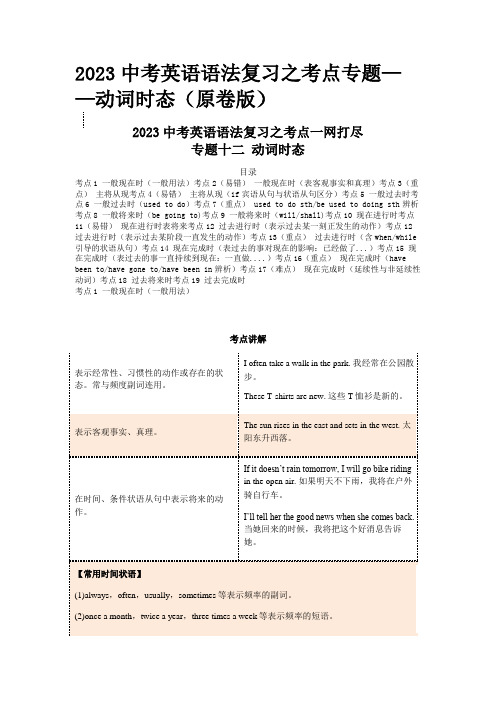
2023中考英语语法复习之考点专题——动词时态(原卷版)2023中考英语语法复习之考点一网打尽专题十二动词时态目录考点1 一般现在时(一般用法)考点2(易错)一般现在时(表客观事实和真理)考点3(重点)主将从现考点4(易错)主将从现(if宾语从句与状语从句区分)考点5 一般过去时考点6 一般过去时(used to do)考点7(重点) used to do sth/be used to doing sth辨析考点8 一般将来时(be going to)考点9 一般将来时(will/shall)考点10 现在进行时考点11(易错)现在进行时表将来考点12 过去进行时(表示过去某一刻正发生的动作)考点12 过去进行时(表示过去某阶段一直发生的动作)考点13(重点)过去进行时(含when/while 引导的状语从句)考点14 现在完成时(表过去的事对现在的影响:已经做了...)考点15 现在完成时(表过去的事一直持续到现在:一直做....)考点16(重点)现在完成时(have been to/have gone to/have been in辨析)考点17(难点)现在完成时(延续性与非延续性动词)考点18 过去将来时考点19 过去完成时考点1 一般现在时(一般用法)考点讲解1.(2021·上海松江·二模)Tim likes watching films. He _________ to the cinema with his girlfriend once a week.A.goes B.is going C.has gone D.will go2.(2020·湖北恩施)I hear that it often ________ in Sichuan and there are usually floods, especially in summer.A.rains B.rained C.will rain3.(2021·北京房山·二模)Mary ________ her grandparents every weekend.A.visits B.was visiting C.is visiting D.has visited4.(2021·广西桂林)The zebra eats grass, but it ________ eat meat.A.doesn’t B.didn’t C.don’t5.(2021·黑龙江·齐齐哈尔市碾子山区教师进修学校一模)—Do you like the flower? —Yes. It ________ sweet.A.is smelling B.smells C.smelt考点2(易错)一般现在时(表客观事实和真理)考点讲解精选练习6.(2020·天津红桥·二模)In the past, people didn't know the earth ________round the sun. A.going B.goes C.will go D.go7.(2021·吉林长春·模拟预测)The teacher told us that the sun ________ in the east. A.rises B.rise C.rose D.rising考点3(重点)主将从现考点讲解精选练习8.(2021·四川乐山)—What’s your plan for the summer holiday?—I’ll go to Chendu as soon as the school term ___________.A.end B.ends C.will end9.(2021·广西河池)Mrs. Green will take her son to the amusement park if she ________ the tickets.A.got B.gets C.is getting D.will get10.(2021·辽宁丹东)We can’t avoid traffic accidents unless everyone ________ the rules. A.follows B.breaks C.will follow D.will break考点4(易错)主将从现(if宾语从句与状语从句区分)考点讲解精选练习11.(2021·辽宁鞍山)—Tina wants to know if you ________ to the park with us tomorrow. —I’d love to. But if it ________, I may go to the library instead.A.go; will rain B.go; rains C.will go; rains D.will go; will rain12.(2020·黑龙江牡丹江)—I wonder if we ________a farewell party next week. —If we________it, I will call you.A.will have ; have B.have;will have C.will have; will have13.(2021·黑龙江哈尔滨)—I wonder if you ________ us for the English party tomorrow. —If I ________ free, I will go with you.A.will join, am B.will join, will be C.join, am考点5 一般过去时考点讲解精选练习14.(2021·广西贵港)—Where does Bill live? —He ________ me his address, but I can’t remember it now.A.tells B.told C.is telling D.will tell15.(2021·四川达州)— Alice has gone out. — Oh, has she? What time ________ she________?A.has; gone B.will; go C.did; go D.is; going16.(2021·江苏徐州)In my school days, I ________ a lot of reading in English every day. That was how I learned English at that time.A.do B.did C.have done D.will do17.(2021·重庆)Last Sunday my brother and I ________ our grandparents.A.will visit B.visits C.visit D.visited18.(2021·内蒙古兴安盟)— Have you ever been to Shanghai? — Of course. Actually, I________ there for six years, but now I live in Beijing.A.worked B.was working C.would work D.have worked考点6 一般过去时(used to do)考点讲解精选练习19.Mr Jiang isn’t as busy as before because there ___________no home robot to help him.A.used to be B.may be C.used to have D.may have20.I ________ in this small mountain village when I was a child.A.use to live B.used to living C.used to live D.used to life21.(2019·江苏镇江)Yao Ming, a basketball giant , ___________ water polo when he was young.A.is playing B.used to play C.is used to playing D.was playing考点7(重点) used to do sth/be used to doing sth辨析考点讲解精选练习22.(2020·湖南益阳)Diana used to _________ to work, but now she is used to ________ because the road is crowded and she wants to keep fit.A.drive; walk B.drive; walking C.driving; walk23.Dick __________ in America, but he has been ___________ Chinese food since he moved to China.A.used to live; used to eating B.is used to live; used to eat C.is used to live; used to eating D.used to living; used to eat24.—How does your brother go to school? —He ___________ ride a bike, but now he__________ there to keep fit.A.used to; is used to walk B.used to; is used for walking C.was used to; is used to walking D.used to; is used to walking考点8 一般将来时(be going to)考点讲解一般将来时表示将来某个时间要发生的动作,事情或存在的状态,也表示将来经常或反复发生的动作或事情。
【中考英语总复习 易错考点分类练】01 名词(解析版)
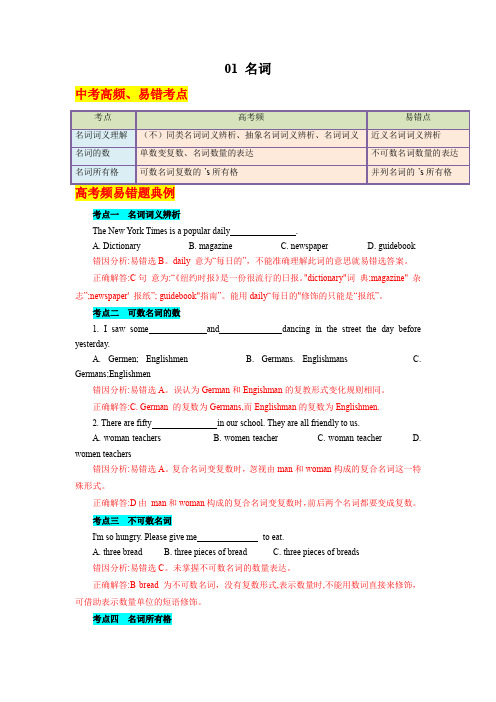
01 名词中考高频、易错考点考点一名词词义辨析The New York Times is a popular daily .A. DictionaryB. magazineC. newspaperD. guidebook错因分析:易错选B。
daily 意为“每日的”,不能准确理解此词的意思就易错选答案。
正确解答:C句意为:“《纽约时报》是一份很流行的日报。
"dictionary"词典;magazine" 杂志”;newspaper' 报纸”; guidebook"指南”。
能用daily“每日的"修饰的只能是“报纸”。
考点二可数名词的数1. I saw some and dancing in the street the day before yesterday.A. Germen; EnglishmenB. Germans. EnglishmansC. Germans;Englishmen错因分析:易错选A。
误认为German和Engishman的复教形式变化规则相同。
正确解答:C. German 的复数为Germans,而Englishman的复数为Englishmen.2. There are fifty in our school. They are all friendly to us.A. woman teachersB. women teacherC. woman teacherD. women teachers错因分析:易错选A。
复合名词变复数时,忽视由man和woman构成的复合名词这一特殊形式。
正确解答:D由man和woman构成的复合名词变复数时,前后两个名词都要变成复数。
考点三不可数名词I'm so hungry. Please give me to eat.A. three breadB. three pieces of breadC. three pieces of breads错因分析:易错选C。
【英语】英语语法八大易错点

英语语法八大易错点[第一类] 名词类1. 这些女老师们在干什么?[误] What are the woman teachers doing?[正] What are the women teachers doing?[析] 在英语中,当一名词作定语修饰另一名词(单或复数形式)时,作定语的名词一般要用其单数形式;但当man, woman作定语修饰可数名词复数形式时,要用其复数形式men, women.2. 房间里有多少人?[误] How many peoples are there in the room?[正] How many people are there in the room?[析] people作“人、人们”解时,是个集合名词,其单复数同形。
3. 我想为我儿子买两瓶牛奶。
[误] I want to buy two bottle of milk for my son.[正] I want to buy two bottles of milk for my son.[析] 表示不可数名词的数量时,常用“a / an或数词+表量的可数名词+ of +不可数名词”这一结构,其中当数词大于1时,表量的可数名词要用其复数形式。
[第二类] 动词类4. 你妹妹通常什么时候去上学?[误] What time does your sister usually goes to school?[正] What time does your sister usually go to school?[析] 借助助动词do(或does)构成疑问句或否定句时,句中的谓语动词用其原形。
5. 琳达晚上经常做作业,但今晚她在看电视。
[误] Linda often do her homework in the evening, but this evening she watching TV.[正] Linda often does her homework in the evening, but this evening she is watching TV.[析] 在初一英语学习阶段,我们接触到了两种主要时态:一般现在时和现在进行时。
- 1、下载文档前请自行甄别文档内容的完整性,平台不提供额外的编辑、内容补充、找答案等附加服务。
- 2、"仅部分预览"的文档,不可在线预览部分如存在完整性等问题,可反馈申请退款(可完整预览的文档不适用该条件!)。
- 3、如文档侵犯您的权益,请联系客服反馈,我们会尽快为您处理(人工客服工作时间:9:00-18:30)。
中考英语(一):英语语法八大易错点[第一类] 名词类
1. 这些女老师们在干什么?
[误] What are the woman teachers doing?
[正] What are the women teachers doing?
[析] 在英语中,当一名词作定语修饰另一名词(单或复数形式)时,作定语的名词一般要用其单数形式;但当man, woman作定语修饰可数名词复数形式时,要用其复数形式men, women.
2. 房间里有多少人?
[误] How many peoples are there in the room?
[正] How many people are there in the room?
[析] people作“人、人们”解时,是个集合名词,其单复数同形。
3. 我想为我儿子买两瓶牛奶。
[误] I want to buy two bottle of milk for my son.
[正] I want to buy two bottles of milk for my son.
[析] 表示不可数名词的数量时,常用“a / an或数词+表量的可数名词+ of +不可数名词”这一结构,其中当数词大于1时,表量的可数名词要用其复数形式。
[第二类] 动词类
4. 你妹妹通常什么时候去上学?
[误] What time does your sister usually goes to school?
[正] What time does your sister usually go to school?
[析] 借助助动词do(或does)构成疑问句或否定句时,句中的谓语动词用其原形。
5. 琳达晚上经常做作业,但今晚她在看电视。
[误] Linda often do her homework in the evening, but this evening she watching TV.
[正] Linda often does her homework in the evening, but this evening she is watching TV.
[析] 在初一英语学习阶段,我们接触到了两种主要时态:一般现在时和现在进行时。
一般现在时表示经常的或习惯性的动作,常和often, usually, sometimes 等时间状语连用。
在一般现在时的句子中,若主语是第三人称单数,谓语动词要用其第三人称单数形式。
现在进行时表示现阶段正在进行或发生的动作,现在进行时由be(am/ is / are)+ving形式构成。
6. 这双鞋是红色的。
[误] This pair of shoes are red.
[正] This pair of shoes is red.
[析] 在shoes, trousers, gloves, glasses等表示成双成对的衣物或工具名词前用
pair(表计量)修饰时,谓语动词的形式由pair的单复数形式来决定。
[第三类] 代词类
7. 这张票是她的,不是我的。
[误] This is hers ticket. It’s not my.
[正] This is her ticket. It’s not mine.
[析]物主代词有形容词性物主代词和名词性物主代词之分。
形容词性物主代词之后一定要接名词,而名词性物主代词之后不需接任何词。
8. 吴老师教我们英语。
[误] Miss Wu teaches our English.
[正] Miss Wu teaches us English.
[析] teach sb. sth..中的sb.作teach的宾语,因此当sb.为人称代词时要用其宾格形式。
[第四类] 介词类
9. 你能找到这个问题的答案吗?
[误] Can you find the answer of this question?
[正] Can you find the answer to this question?
[析] 英语中用“the answer to …”表示“……的答案”。
类似结构还有the key to the door, the way to the zoo等。
10. 格林先生星期六上午来这里。
[误] Mr. Green will come here in Sunday evening.
[正] Mr. Green will come here on Sunday evening.
[析] 表示在上午、下午等时,介词要用in;而表示在具体的某天上午、下午时,介词要用on.
11. 那个穿着红裙子的小女孩是我们老师的女儿。
[误] That little girl on a red skirt is our teacher’s daughter.
[正] That little girl in a red skirt is our teacher’s daughter.
[析] 用介词表示“穿戴衣物”时,只能用in,其他介词没有此用法。
[第五类] 副词类
12. 莉莉,你为什么不回家呢?
[误] Lily, why don’t you go to home?
[正] Lily, why don’t you go home?
[析] come, go 等后接here, there, home等地点副词时,地点副词前不加to。
[第六类] 连词类
13. 我喜欢语文和英语,但我不喜欢体育和历史。
[误] I like Chinese and English, but I don’t like P.E. and history.
[正] I like Chinese and English, but I don’t like P.E. or history.
[析] 在肯定句中并列成分之间用and来连接;而在否定句中,并列成分之间的连接需用or。
[第七类] 冠词类
14. 乘飞机去北京花了史密斯一家人一个小时。
[误] It takes Smiths a hour to go to Beijing by a plane.
[正] It takes the Smiths an hour to go to Beijing by plane.
[析] 1.表示“……一家人”用结构“the + 姓氏复数”;
2.our 一词的第一个字母不发音,它是以元音音素开头的,所以“一小时”要用an hour;
3.用介词by表示“乘坐”某种交通工具时,交通工具名词前不加任何冠词。
[第八类] 句法类
15. ――你不是学生吗?――不,我是学生。
[误] ――Aren’t you a student? ――No,I am.
[正] ――Aren’t you a student? ――Yes,I am.
[析]对否定疑问句的回答是用Yes还是用No,这取决于实际情况:如果事实是肯定的,就用Yes表“不”;如果事实是否定的,就用No表“是的”。
2. 房间里有多少人?
[误] How many peoples are there in the room?
[正] How many people are there in the room?
[析] people作“人、人们”解时,是个集合名词,其单复数同形。
